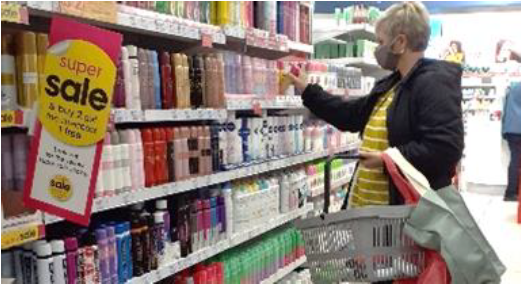Health and beauty are growing categories within the fast-moving consumer goods (FMCG) trade, represented by a wide range of products and services that support the physical and mental wellness of consumers.
There are five specific themes that are shaping the health and beauty market: 1) wellness has growth to be a global megatrend, 2) the resilience of the health and beauty markets showing growth even during times of recession, 3) the FMCG retail market is shopper-led, responding to changing shopper needs and preferences, 4) retail trends shaping the health and beauty categories within the South African FMCG market, and 5) disruptors driving unexpected change in these wellness categories.


Wellness has risen to the status of megatrend, represented by global shifts in consumer behaviour and impacting multiple industries. In fact, wellbeing was listed as the #1 global consumer trend for 2020-2030 by Mintel, in a report released on 5 November 2019. That was before the arrival of the COVID pandemic, which has subsequently dialled up the relevance of wellbeing in consumers’ lives. Within the categories of health and beauty, there are multiple trends that underpin wellness as a megatrend. Drivers that are influencing wellness include access to information, empowering consumers with the knowledge to understand their health and beauty needs. Developing technologies enable personalisation as a prominent trend within the health and beauty markets. Technology provides insights into consumer preferences and shopping behaviour, while DNA testing is taking health and beauty personalisation into another dimension. Sustainability is becoming a key driver of consumer behaviour whereby consumers are starting to understand their impact their environment.

 Within South Africa, the health and beauty category is showing great potential following sustained growth since 2014 – in fact, health and beauty has outperformed total retail sales for a number of years. There is ‘resilience’, sometimes referred to as ‘defensiveness’ in the wellness industry during tough economic conditions and during times of recession as consumers prioritise their health and wellbeing.
Within South Africa, the health and beauty category is showing great potential following sustained growth since 2014 – in fact, health and beauty has outperformed total retail sales for a number of years. There is ‘resilience’, sometimes referred to as ‘defensiveness’ in the wellness industry during tough economic conditions and during times of recession as consumers prioritise their health and wellbeing.
Looking forward, the health and beauty category is expected to maintain its growth momentum, which currently sits above the growth rate of edible groceries.
With such promising and continuous growth seen over the past five years in the health and beauty markets, participation within these categories is imperative to a growth strategy for both retailers and suppliers.

![]()
There are various disruptors impacting the growth dynamics of the health and beauty markets. The COVID-19 pandemic is one of the single biggest change-agents we have seen in this generation, impacting shopper needs through all the basic macro-environmental drivers, increasing the shopper’s need for wellness. The #nomakeup movement and beauty-from-within trend is reducing the relevance of colour cosmetics in some consumer groups, while increasing the relevance of ingestible beauty products and personal care. Ingredient innovation breaking across categories is another significant disruptor within health and beauty.



 Since value is a necessity for the shopper, competitive pricing and value promotions are key focus areas. Loyalty programmes serve retention strategies, mainly through value-added loyalty offerings, but also through consumer engagement. Value-added services within retail outlets unlock value, drive footfall, customer retention and loyalty. Customer experience is another focus area, with personalisation as one of the most effective drivers of shopper loyalty. The development of shopper-centric, future-fit channels is very relevant to the evolution of health and beauty within South African FMCG retail. The discount positioning of health and beauty retail is benefiting the increased relevance of health and beauty within the discount channel. E-commerce is showing strong growth within health and beauty. Shoppertainment is driving experiential retail and lifestyle-focused initiatives. And the growth of convenience is a driver of store expansion strategies within health and beauty. At the same time, health is infiltrating interesting spaces within retail, including fashion, sweets, fast food and even liquor.
Since value is a necessity for the shopper, competitive pricing and value promotions are key focus areas. Loyalty programmes serve retention strategies, mainly through value-added loyalty offerings, but also through consumer engagement. Value-added services within retail outlets unlock value, drive footfall, customer retention and loyalty. Customer experience is another focus area, with personalisation as one of the most effective drivers of shopper loyalty. The development of shopper-centric, future-fit channels is very relevant to the evolution of health and beauty within South African FMCG retail. The discount positioning of health and beauty retail is benefiting the increased relevance of health and beauty within the discount channel. E-commerce is showing strong growth within health and beauty. Shoppertainment is driving experiential retail and lifestyle-focused initiatives. And the growth of convenience is a driver of store expansion strategies within health and beauty. At the same time, health is infiltrating interesting spaces within retail, including fashion, sweets, fast food and even liquor.
These five themes will continue to grow and shape the health and beauty markets as the ongoing COVID-19 pandemic amplifies the importance of wellness globally. With such promising and continuous growth seen over the past five years in the health and beauty markets, participation within these categories is imperative to an FMCG brand and business growth strategy.
Download the opinion article HERE
For a more detailed view, as well as insights and opportunities for suppliers within the health and beauty categories, subscribe to the Trade Intelligence Health and Beauty Report or attend our retail briefing on 10 June 2021.
Click here for more information.






